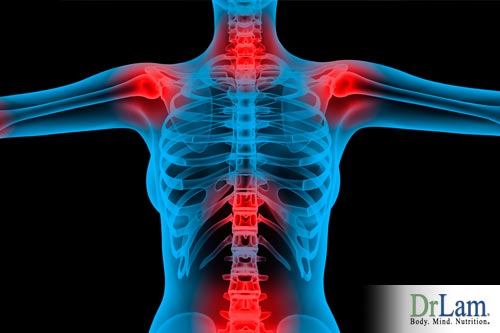 Nearly every illness, disease, and chronic condition has inflammation as a contributing factor, if not a major cause. This article will talk about what inflammation is, how it affects the NeuroEndoMetabolic (NEM) Response System, and how the anti-inflammation diet consists of inflammation reducing foods can help reduce inflammation and, with it, your risk of disease.
Nearly every illness, disease, and chronic condition has inflammation as a contributing factor, if not a major cause. This article will talk about what inflammation is, how it affects the NeuroEndoMetabolic (NEM) Response System, and how the anti-inflammation diet consists of inflammation reducing foods can help reduce inflammation and, with it, your risk of disease.
If inflammation is a contributing factor in nearly all disease, it must be a bad thing, right? Not exactly. It’s not inflammation that’s the problem, it’s too much inflammation, or inflammation that persists for too long that causes problems. Inflammation plays a major role in fighting infection and stimulating healing. Consuming too much processed food can increase inflammation, while inflammation reducing foods diet encourages the immune system to only produce inflammation as needed.
When injury occurs, the immune system responds by flooding the area with white blood cells. The white blood cells produce substances intended to protect against infection and stimulate healing. These substances can cause an area to become red, sore, and a bit swollen. Your immune system is fighting any foreign microorganisms that may have gained entry before they can invade the rest of your body, removing damaged cells, and stimulating healing. In the case of injury, the redness, soreness, and swelling are signs the body is doing what it needs to do.
However, in some people, the immune system becomes overactive and kicks into gear even when there is no injury. In this case, with nothing productive to do, the white blood cells attack healthy tissue, treating it as if it were damaged or in some way unhealthy. Following an inflammation reducing foods diet can encourage the immune system to function in a more healthy way.
Inflammation can also occur in the face of emotional or psychological stress, though the response is generally less intense than when it is triggered by physical stress. Remember that the body cannot distinguish between actual and perceived injury, or between physical and emotional injury. Prolonged psychological strain or emotional stress leads to continuously low levels of inflammation. Even at low levels, continuous inflammation interferes with the body’s ability to maintain equilibrium, leaving you vulnerable to disease. In fact, it is this continuous inflammation that is responsible for many of the symptoms we typically associate with aging. The modern diet, with all the processed foods and shortage of high quality nutrition, could be called an inflammation diet, because it only serves to increase inflammation. The good news is, it is also possible to reduce inflammation with diet.
Symptoms of chronic inflammation are typically more subtle than those of acute inflammation due to injury. Chronic inflammation can cause food sensitivities, unexplained pain, brain fog, bloating, irritable bowel, anxiety, depression, and even frequent infections.
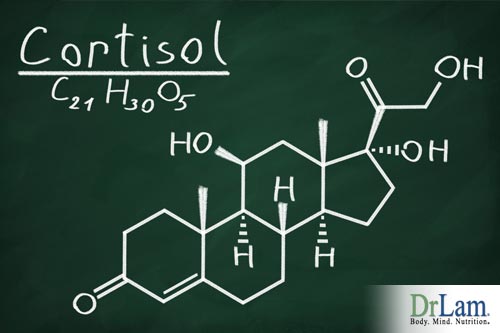 The link between inflammation and adrenal fatigue is strong. When the body is healthy. This can be facilitated by eating inflammation reducing foods, the immune system is strictly regulated so that it only produces inflammation as needed to fight invaders and stimulate healing, then turns off once its job is done. Turning off the inflammation process is the job of cortisol, a stress hormone produced by the adrenal glands. When the adrenal glands are not functioning well, they are unable to produce enough cortisol to turn off the process, and inflammation continues unchecked.
The link between inflammation and adrenal fatigue is strong. When the body is healthy. This can be facilitated by eating inflammation reducing foods, the immune system is strictly regulated so that it only produces inflammation as needed to fight invaders and stimulate healing, then turns off once its job is done. Turning off the inflammation process is the job of cortisol, a stress hormone produced by the adrenal glands. When the adrenal glands are not functioning well, they are unable to produce enough cortisol to turn off the process, and inflammation continues unchecked.
Inflammation from a chronic condition is generally localized, such as in the arteries with heart disease, in the brain with dementia, or the pancreas in diabetes. Environmental toxins and unhealthy diet can lead to widespread inflammation that affects various parts of the body, sometimes including the brain.
To sum up, inflammation is how your body responds to stress, and the adrenal glands secrete cortisol to halt the process so the body can return to normal when a threat is abated. However, when stress is constant, this process cannot really end, so the adrenal glands are constantly secreting cortisol in an effort to control the process. Over time, the adrenal glands become unable to produce the amount of cortisol needed to manage the inflammation process and symptoms of chronic inflammation begin to crop up. This leads to adrenal fatigue and adrenal gland disorders.
To understand how the inflammation process works, it’s important to look at the major systems involved, specifically the immune system, the digestive tract, the microbiome, and the brain.
The immune system has two parts, innate and adaptive. Adaptive immunity consists of specialized cells that respond to specific threats. When you gain immunity to an illness, whether by being vaccinated or by experiencing and recovering from the illness, the adaptive immune system is activated. The role of the innate immune system is to respond to any kind of threat, from any source. Inflammation is part of this system. Besides attacking invaders (and sometimes healthy tissue), inflammation is responsible for stimulating the development of new blood vessels to supply blood to repair damaged tissue. Unfortunately, the most common treatment for chronic inflammation is to suppress the immune system rather than attempting to heal the body so the immune system can function normally.
While inflammation is a basic function of the immune system, most inflammatory diseases begin in the digestive tract. Inflammation in the digestive tract can easily spin out of control and affect the entire body. This is because the inner lining of the digestive tract is semipermeable, and becomes more permeable in response to certain functions and chemical reactions, allowing hard to digest food particles to enter the bloodstream, along with pathogens and toxins. The body responds to these invaders with, you guessed it, an inflammatory response. The digestive tract, in turn, becomes less able to extract and absorb nutrients from food.
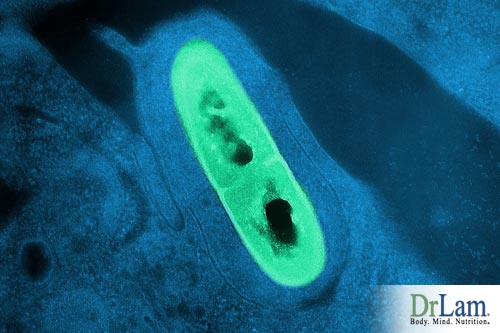 Your body is not just one organism, but rather, is made up of trillions of microorganisms, collectively known as your microbiome, that all serve to keep your body functioning and healthy. Many of these microorganisms are located in the digestive tract and are responsible for helping to extract and use nutrients from food. However, the microbiome can be easily affected by illness, stress, antibiotics, and other factors. When this happens, a number of inflammatory and metabolic diseases can develop, normal gut function may be compromised, and harmful microorganisms can move in, producing toxins and irritating the lining, causing more inflammation. Consuming probiotics and prebiotics, as part of an overall anti-inflammation diet, can help repopulate the gut with healthy bacteria and nourish them so they can multiply and reduce gut inflammation.
Your body is not just one organism, but rather, is made up of trillions of microorganisms, collectively known as your microbiome, that all serve to keep your body functioning and healthy. Many of these microorganisms are located in the digestive tract and are responsible for helping to extract and use nutrients from food. However, the microbiome can be easily affected by illness, stress, antibiotics, and other factors. When this happens, a number of inflammatory and metabolic diseases can develop, normal gut function may be compromised, and harmful microorganisms can move in, producing toxins and irritating the lining, causing more inflammation. Consuming probiotics and prebiotics, as part of an overall anti-inflammation diet, can help repopulate the gut with healthy bacteria and nourish them so they can multiply and reduce gut inflammation.
Though located in the gut, your microbiome strongly influences the function of your brain. In fact, the gut has often been referred to as a sort of second brain, and about 75-80% of your neurotransmitters are produced in the gut. Any disturbance in either the central nervous system or the enteric nervous system, a system of neurons that governs the digestive tract, impairs your ability to respond effectively to stress.
The most common strategy for treating inflammation is with nonsteroidal anti inflammatory drugs (NSAIDs) like ibuprofen or acetaminophen. The problem with these kinds of medication is that, while they effectively suppress the inflammatory response, they do nothing to address the conditions that give rise to excessive inflammation.
Other pharmaceutical strategies for reducing inflammation include steroids and statins. Steroids work by inhibiting the entire immune system, increasing risk of infection, along with other undesirable side effects. Statins are designed to lower cholesterol, but they also have anti inflammatory properties, again with a number of undesirable side effects.
Following an inflammation reducing foods diet can reduce inflammation without undesirable side effects. Many individuals have been able to reduce and, in some cases even eliminate, their need for anti-inflammatory medications. An effective anti-inflammation diet involves restricting or eliminating foods shown to increase inflammation (primarily highly processed foods, refined sugar, and unhealthy fats), while consuming more of those foods that serve to decrease inflammation in the body (primarily fruits and vegetables, lean meat, and many spices).
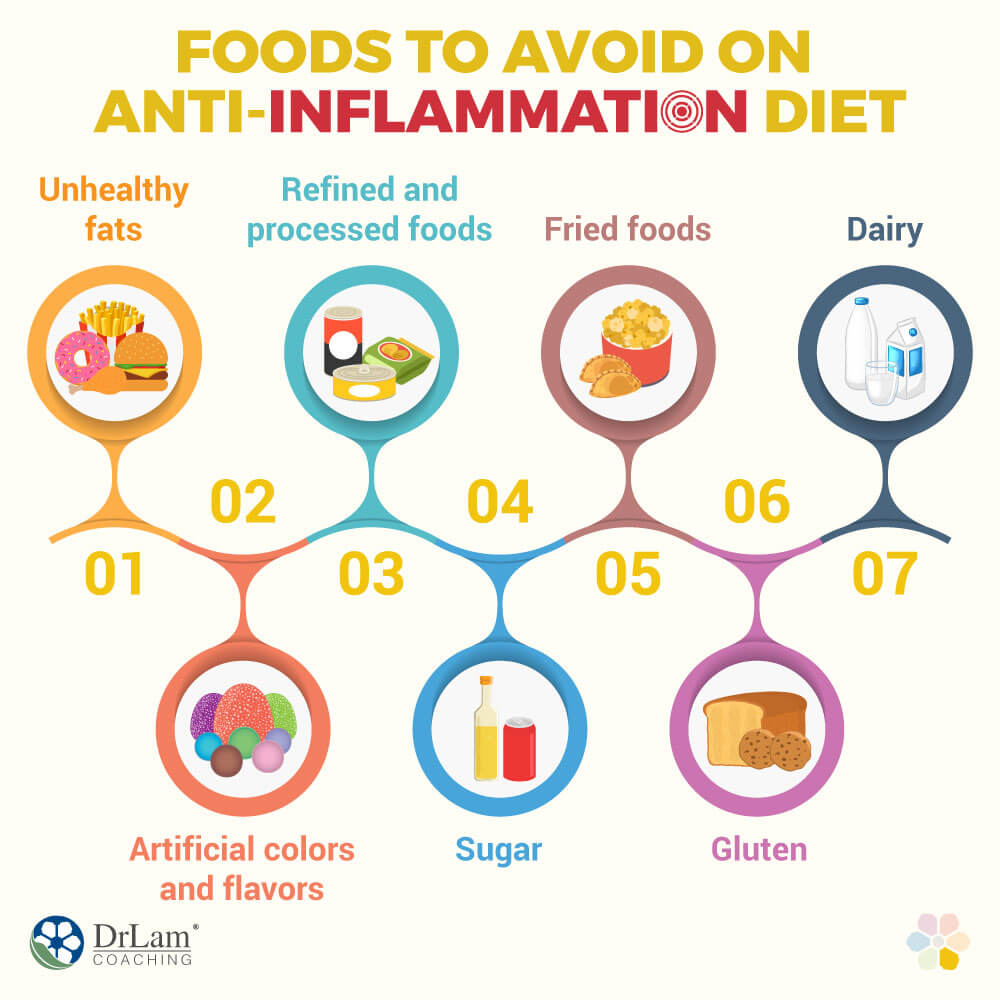
Eliminate or strictly limit the following foods in your diet to decrease inflammation:
Unhealthy fats - Saturated fats and trans fats tend to increase overall inflammation, as well as increase the risk of various diseases.
Artificial colors and flavors - These additives are made from petroleum byproducts that can disrupt hormone function and increase inflammation.
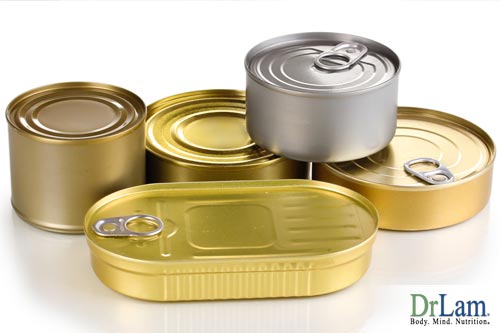 Refined and processed foods - Packaged snacks, canned foods, and other common foods are often high in unhealthy fats, as well as added sugar, sodium, artificial colors and flavors, and other additives.
Refined and processed foods - Packaged snacks, canned foods, and other common foods are often high in unhealthy fats, as well as added sugar, sodium, artificial colors and flavors, and other additives.
Sugar - Sugar and refined carbohydrates increase the levels of cytokines, cells that increase inflammation, in the bloodstream. This includes high fructose corn syrup and white flour.
Fried foods - Cooking foods with oil at high heat produces a neurotoxin that can increase inflammation.
Gluten - Many doctors will tell you that only those with celiac disease need to worry about gluten. However, many people without celiac disease have noticed a decline in many symptoms when they eliminate or reduce gluten as part of an overall inflammation reducing foods diet.
Dairy - Despite what the dairy industry would have you believe, we are not actually intended to consume milk from other species, and not at all beyond weaning. It is actually a genetic mutation that allows some people to tolerate the casein (protein) and lactose (sugar) in milk. Many people notice a decline in inflammation when they eliminate dairy from their diet.
Essentially, nearly the whole of the modern diet is a diet of inflammation. The good news is, when you replace these foods with wholesome, inflammation busting foods, you’ll feel better, sidestep illness (even those pesky winter flus that seem to hit everyone in the office) and have more energy. The even better news is that, within a few weeks of consuming inflammation reducing foods, you may begin to notice your cravings for junk food have been replaced by cravings for healthy fare.
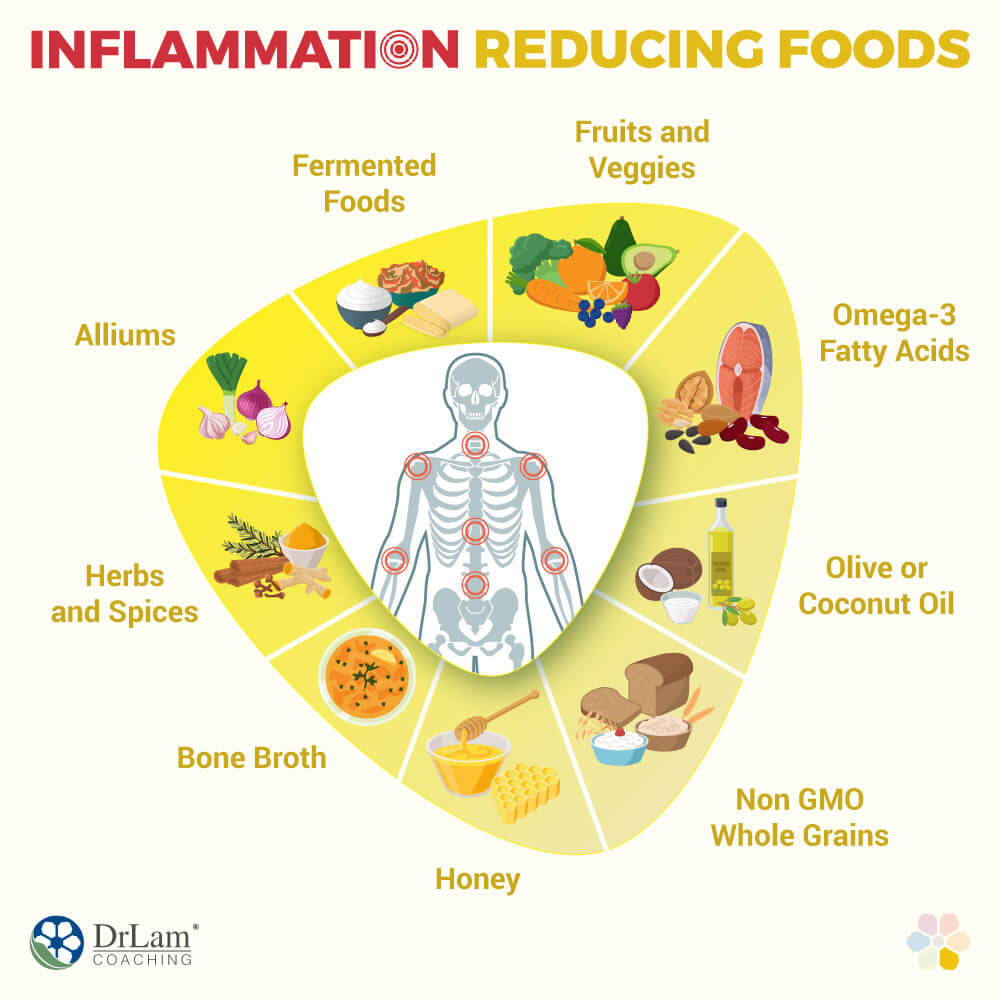
Fruits and veggies - Fruits and vegetables are high in antioxidants and vitamins that improve cellular health and lower inflammation. Dark, leafy greens in particular are high in vitamin E, which has been shown to reduce cytokines.
Omega-3 fatty acids - There is a reason fish is considered to be brain food, and that’s because they are especially high in anti-inflammatory omega-3 fatty acids. Other good sources include flaxseed, chia seeds, and nuts, especially walnuts and almonds.
Olive or coconut oil - Both oils are high in anti-inflammatory antioxidants and can be used to replace vegetable oil in nearly any recipe.
Whole grains - Whole grains are high in fiber, which reduces levels of c-reactive protein, a marker of inflammation in the blood. Look for foods that have whole grain as the first ingredient and have no added sugar.
Honey - A diet without sweets can be rather dull, but sugar is out. Honey, however, can satisfy that sweet tooth, and do it with compounds that have been shown to reduce inflammation. Win-win.
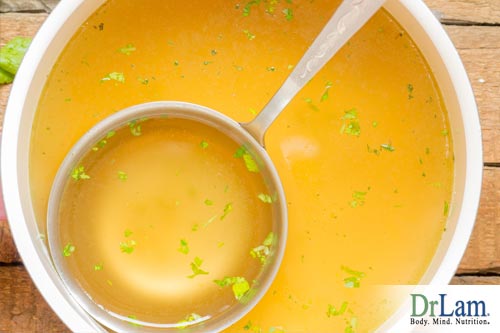 Bone broth - Bone broth is high in many critical minerals your body needs to function smoothly and reduce inflammation. Bone broth is also a good source of collagen, which can help heal damaged intestinal lining and is an important component of all inflammation reducing foods.
Bone broth - Bone broth is high in many critical minerals your body needs to function smoothly and reduce inflammation. Bone broth is also a good source of collagen, which can help heal damaged intestinal lining and is an important component of all inflammation reducing foods.
Herbs and Spices - Ginger, turmeric, rosemary, cloves, cinnamon, nutmeg, oregano, sage, thyme, and more all contain powerful anti-inflammatory compounds. Be careful, though, of pre made seasoning mixes, as these may be high in added sugar, colorings, and other additives.
Alliums - Garlic, onions, and other foods in the allium family are high in anti-inflammatory compounds.
Fermented foods - Kefir, kimchee, miso, tempeh, sauerkraut, pickles, and other fermented foods are excellent probiotics that help repopulate the healthy bacteria in your gut. Fermented foods can also help your body eliminate toxins that stimulate inflammation, a double whammy in inflammation reducing foods.
Drinking too much alcohol increases inflammation. However, some studies show that red wine, in moderation, can decrease inflammation, while other studies show it actually increases inflammation in some individuals, particularly those with certain types of arthritis. If you drink alcohol, limit your consumption to no more than two glasses a day, and switch to red wine.
Inflammation is turning out to be one of the biggest health threats in the modern world. It's the silent killer that's linked to cancer, heart disease, and a whole host of other life threatening problems. Knowing all of this, making the change to inflammation reducing foods could do more than improve your health. It could quite literally help to save your life. Here's how to reduce inflammation in your body naturally and easily:
For more information on how inflammation could affect your health and quality of life, talk to our team by clicking here or give us a call on +1 (626) 571-1234.
© Copyright 2016-2020 Michael Lam, M.D. All Rights Reserved.
